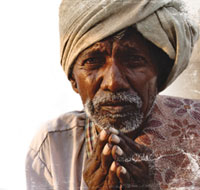Lazy Monday Reads
Posted: March 30, 2015 Filed under: morning reads | Tags: dalits, religious bigotry, untouchables 17 CommentsGood Afternoon!
Well, it’s my turn to be so busy and exhausted that I’m late with the post! I also have to admit that I really didn’t want to look at the news much this weekend  since most of it’s been Republicans running rabid all over state legislatures any way. I’d like to continue to focus on the dangerous and Constitutionally subversive “religious freedom” bills in Indiana and other places.
since most of it’s been Republicans running rabid all over state legislatures any way. I’d like to continue to focus on the dangerous and Constitutionally subversive “religious freedom” bills in Indiana and other places.
Much like the arguments for slavery and Jim Crow Laws, bigoted people who happen to use the bible to back up their perverse christianist views basically feel they have a right to ignore laws they don’t like. Not only does this include refusing public accommodations to GLBT, it includes refusing prescription services and complete health care to women. I believe it’s only a time before we start seeing people refuse to serve various religious groups or other minorities because their ‘bible’ tells them so. Fortunately and at least up until the freaking Hobby Lobby Decision, SCOTUS and the Constitution disagree.
I’m using pictures today from a BBC photo News special on India’s Untouchables and from an advocacy group for Dalit in India. Indian’s ancient caste system is a pretty good example of what these laws seek to do.
Here’s a few links of interest.
 There are actually 19 states with similar laws to Indiana. You might remember that Arizona’s Governor Brewster actually vetoed similar legislation over warnings from the business community. There’s a chart there at WAPO if you’d like to check the status of your state.
There are actually 19 states with similar laws to Indiana. You might remember that Arizona’s Governor Brewster actually vetoed similar legislation over warnings from the business community. There’s a chart there at WAPO if you’d like to check the status of your state.
Forty percent of U.S. states have something similar to Indiana, as does the federal government.
A federal RFRA signed by President Clinton in 1993 shares language with Indiana and other states’ bills, prohibiting the government from “substantially burdening” individuals’ exercise of religion unless it is for a “compelling government interest” and is doing so in the least restrictive means.
The fact that legislation like this is so widespread probably gave Pence some confidence in signing the bill, despite the controversy in Arizona last year over its bill that was ultimately scrapped, and in other states, likeGeorgia, which are considering similar measures this year (the NCSL found 13 additional states are considering their own RFRA legislation).
Indiana’s law has some differences which makes it ripe for protest.
There’s a factual dispute about the new Indiana law. It is called a “Religious Freedom Restoration Act,” like the federal Religious Freedom Restoration Act, passed in 1993.* Thus a number of its defenders have claimed it is really the same law. Here, for example, is the Weekly Standard’s John McCormack: “Is there any difference between Indiana’s law and the federal law? Nothing significant.” I am not sure what McCormack was thinking; but even my old employer, The Washington Post, seems to believe that if a law has a similar title as another law, they must be identical. “Indiana is actually soon to be just one of 20 states with a version of the Religious Freedom Restoration Act, or RFRA,” thePost’s Hunter Schwarz wrote, linking to this map created by the National Conference of State Legislatures.
The problem with this statement is that, well, it’s false. That becomes clear when you read and compare those tedious state statutes. If you do that, you will find that the Indiana statute has two features the federal RFRA—and most state RFRAs—do not. First, the Indiana law explicitly allows any for-profit business to assert a right to “the free exercise of religion.” The federal RFRA doesn’t contain such language, and neither does any of the state RFRAs except South Carolina’s; in fact, Louisiana and Pennsylvania, explicitly exclude for-profit businesses from the protection of their RFRAs.
The new Indiana statute also contains this odd language: “A person whose exercise of religion has been substantially burdened, or is likely to be substantially burdened, by a violation of this chapter may assert the violation or impending violation as a claim or defense in a judicial or administrative proceeding, regardless of whether the state or any other governmental entity is a party to the proceeding.” (My italics.) Neither the federal RFRA, nor 18 of the 19 state statutes cited by the Post, says anything like this; only the Texas RFRA, passed in 1999, contains similar language.
What these words mean is, first, that the Indiana statute explicitly recognizes that a for-profit corporation has “free exercise” rights matching those of individuals or churches. A lot of legal thinkers thought that idea was outlandish until last year’s decision in Burwell v. Hobby Lobby Stores, in which the Court’s five conservatives interpreted the federal RFRA to give some corporate employers a religious veto over their employees’ statutory right to contraceptive coverage.
Second, the Indiana statute explicitly makes a business’s “free exercise” right a defense against a private lawsuit by another person, rather than simply against actions brought by government. Why does this matter? Well, there’s a lot of evidence that the new wave of “religious freedom” legislation was impelled, at least in part, by a panic over a New Mexico state-court decision, Elane Photography v. Willock. In that case, a same-sex couple sued a professional photography studio that refused to photograph the couple’s wedding. New Mexico law bars discrimination in “public accommodations” on the basis of sexual orientation. The studio said that New Mexico’s RFRA nonetheless barred the suit; but the state’s Supreme Court held that the RFRA did not apply “because the government is not a party.”
Remarkably enough, soon after, language found its way into the Indiana statute to make sure that no Indiana court could ever make a similar decision.
Because of these differences, it can be argued that the Media may be misrepresenting the law. This is in reference to the WAPO post above.
On Friday, the Washington Post published an article titled “19 states that have ‘religious freedom’ laws like Indiana’s that no one is boycotting.” The article snarks about organizations like the NCAA that have protested Indiana’s law, noting “the NCAA didn’t say it was concerned over how athletes and employees would be affected by Kentucky’s RFRA when games were played there last week.” The piece concludes “Indiana might be treated as if it’s the only state with a bill like this, but it’s not.” The piece has been shared over 75,000 times on Facebook.
The Washington Post article largely mirrors the argument advanced by Indiana Governor Mike Pence. Appearing on ABC’s This Week, Pence claimed “Then state-Sen. Barack Obama voted for [the Religious Freedom Restoration Act]. The very same language.”
The same argument is parroted on Fox News and elsewhere.
The Indiana law differs substantially from the federal Religious Freedom Restoration Act, signed by President Clinton in 1993, and all other state RFRAs.
There are several important differences in the Indiana bill but the most striking is Section 9. Under that section, a “person” (which under the law includes not only an individual but also any organization, partnership, LLC, corporation, company, firm, church, religious society, or other entity) whose “exercise of religion has been substantially burdened, or is likely to be substantially burdened” can use the law as “a claim or defense… regardless of whether the state or any other governmental entity is a party to the proceeding.”
Every other Religious Freedom Restoration Act applies to disputes between a person or entity and a government. Indiana’s is the only law that explicitly applies to disputes between private citizens.* This means it could be used as a cudgel by corporations to justify discrimination against individuals that might otherwise be protected under law. Indiana trial lawyer Matt Anderson, discussing this difference, writes that the Indiana law is “more broadly written than its federal and state predecessors” and opens up “the path of least resistance among its species to have a court adjudicate it in a manner that could ultimately be used to discriminate…”
This is not a trivial distinction. Arizona enacted an RFRA that applied to actions involving the government in 2012. When the state legislature tried to expand it to purely private disputes in 2014, nationwide protests erupted and Jan Brewer, Arizona’s Republican governor, vetoed the measure.
Thirty law professors who are experts in religious freedom wrote in February that the Indiana law does not “mirror the language of the federal RFRA” and “will… createconfusion, conflict, and a wave of litigation that will threaten the clarity of religious liberty rights in Indiana while undermining the state’s ability to enforce other compelling interests. This confusion and conflict will increasingly take the form of private actors, such as employers, landlords, small business owners, or corporations, taking the law into their own hands and acting in ways that violate generally applicable laws on the grounds that they have a religious justification for doing so. Members of the public will then be asked to bear the cost of their employer’s, their landlord’s, their local shopkeeper’s, or a police officer’s private religious beliefs.”
Various federal courts have differing interpretations of the scope of the federal RFRA. The Indiana law explicitly resolves all those disputes in one direction — and then goes even further.
Make no mistake about it, religious ‘freedom’ laws are about bigotry and discrimination. Apple CEO’s Tim Cook has taken a very public stance on these bills as a member of the business community and a gay man from the South.
as a member of the business community and a gay man from the South.
There’s something very dangerous happening in states across the country.
A wave of legislation, introduced in more than two dozen states, would allow people to discriminate against their neighbors. Some, such as the bill enacted in Indiana last week that drew a national outcry and one passed in Arkansas, say individuals can cite their personal religious beliefs to refuse service to a customer or resist a state nondiscrimination law.
Others are more transparent in their effort to discriminate. Legislation being considered in Texas would strip the salaries and pensions of clerks who issue marriage licenses to same-sex couples — even if the Supreme Court strikes down Texas’ marriage ban later this year. In total, there are nearly 100 bills designed to enshrine discrimination in state law.
These bills rationalize injustice by pretending to defend something many of us hold dear. They go against the very principles our nation was founded on, and they have the potential to undo decades of progress toward greater equality.
America’s business community recognized a long time ago that discrimination, in all its forms, is bad for business. At Apple, we are in business to empower and enrich our customers’ lives. We strive to do business in a way that is just and fair. That’s why, on behalf of Apple, I’m standing up to oppose this new wave of legislation — wherever it emerges. I’m writing in the hopes that many more will join this movement. From North Carolina to Nevada, these bills under consideration truly will hurt jobs, growth and the economic vibrancy of parts of the country where a 21st-century economy was once welcomed with open arms.
We’ve had a history of repeating the mistakes that our founders sought to fix in the Constitution. Let’s stop this entire movement dead in its tracks. These people may think that their religious bigotry puts them above the law, but it doesn’t and it shouldn’t.
What’s on your reading and blogging list today? This is an open thread.






Recent Comments